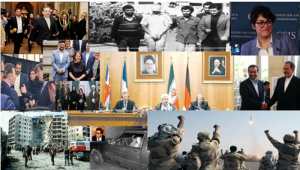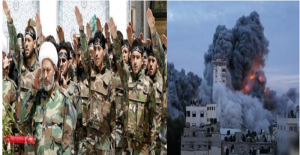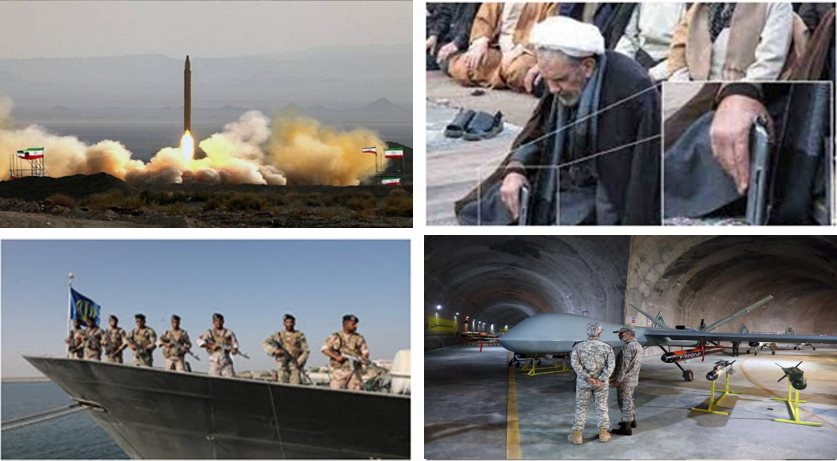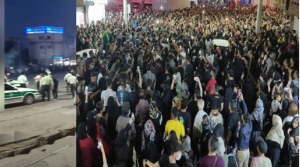(Video) Why Firmness Will Prevent War with Iran

In the aftermath of the October 7 attacks and the devastating conflict that followed, the international community faces a stark dilemma: How can the world address the Iranian regime’s enduring terrorist agenda without igniting a full-blown conflict in Middle East?

Tehran’s lobbies in the West contend that other states have to “deal” with the regime diplomatically instead of alienating it. That will have disastrous consequences as the regime will perceive it as a weakness and will escalate its destructive behavior .

The Iranian regime’s survival is dependent on two critical pillars: suppression at home, terrorism and warmongering abroad. The regime’s Middle East strategy revolves around the concept of “strategic depth,” which involves regional influence by proxy militias.
The clerics use their lobbyists to evade accountability for their crimes and promote the narrative that the only way to avoid a war is to compromise with Iran.
This lingering question echoes across global capitals as Tehran-backed militias cast a foreboding shadow over the region. However, the prevailing belief that countering and standing firm against Tehran’s aggressions may inevitably lead to war is a misconception a narrative woven by the Iranian regime itself.
Tehran’s lobbies in the West contend that other states have to “deal” with the regime diplomatically instead of alienating it.
That approach begets more terrorism and will have disastrous consequences as the regime will perceive it as a weakness and will escalate its destructive behavior.
The regime’s history and nature show that it only moves away from aggression when faced with a firm stance. Contrary to the apprehension surrounding resolute actions, such methods are not a harbinger of war but rather a strategic imperative in quelling Tehran’s aggression.
Iran’s regional strategy
The Iranian regime’s survival is dependent on two critical pillars: suppression at home, and spreading terrorism and warmongering abroad. The regime’s Middle East strategy revolves around the concept of “strategic depth,” which involves fostering regional influence through the support of proxy militias and non-state actors.
More importantly, the regime’s internal challenges, including economic hardships and political unrest, further fueled its desire to project power beyond its borders. Tehran firmly believes that suppressing domestic dissent becomes more manageable when attributed to a foreign enemy.
By supporting proxy groups, Iran aims to venture its influence into strategically important regions, such as Lebanon, Syria, Yemen, Iraq, and even North Africa. These militias serve as surrogate forces, carrying out Iran’s objectives without directly implicating the Iranian military.
The use of proxy militias has been particularly effective in Lebanon, where Hezbollah has emerged as a powerful political and military force. In Syria, Iran has played a central role in propping up the Assad regime, providing military assistance and financial support. Iraq, too, has witnessed Iranian influence through the support of Shiite militias.
This strategy allows Iran to maintain plausible deniability, expanding its reach and influence while obscuring the lines of accountability. This has made it increasingly difficult to address the root causes of regional instability, which works to the advantage of Tehran.
However, this concept is inherently self-revealing: The extensive network of paramilitary forces maintained by the Iranian regime functions as a powerful symbol of perceived strength, projecting an image of invincibility to gain concessions from the West.
The regime’s lobby then builds arguments atop this perception, concluding that Tehran’s ruling mullahs are here to stay and must be appeased. Nevertheless, the regime’s true military capabilities are constrained, and its dependence on proxy forces underscores an intrinsic weakness and vulnerability.
Ironically, as Tehran continues to wreak havoc in the Middle East, Iranian officials consistently maintain that Iran is the safest and most stable country in a tumultuous region.
Supreme Leader Ali Khamenei underscores this perspective on a dedicated page on his website, famously contending, “If we don’t confront the enemy beyond our borders, we will inevitably face them within our own cities.”
Contrary to what it endeavors to portray globally, Iran has not faced external adversaries in the last three decades. Instead, it has been engaged in a relentless struggle with its own population.
For years, the regime has faced a primary adversary in the form of a sustained uprising that cuts across geographical, ethnic, religious, class, and gender lines.
What Iranian officials think about war?
Over the last three decades, the regime has spent billions of dollars on a nuclear weapons program and a diverse ballistic missile program, both geographically dispersed across the country.
Tehran also regularly orchestrates war games, and military parades, and conducts cyber operations worldwide to showcase the regime’s capacity and present itself as more powerful than it actually is.
Tehran apologists and lobbyists argue that the US risks war if it stands firm against the regime. However, despite all its military investments and bold rhetoric, the regime is well aware that a war with the US is exactly the opposite of the regime’s strategy for survival.
Yet actions often speak louder than words. The past decade has seen Israel conduct hundreds of attacks on Iranian regime targets in Syria and Lebanon without eliciting any response from Tehran.
The regime, in an unusual departure from its standard practice of holding elaborate funerals for war casualties and state officials, has not only refrained from responding to the killings of its forces and commanders in Syria but has also actively sought to conceal these losses.
This lack of retaliation has fueled frustration among its ranks, interpreting it as a sign of weakness.
Following the October 7 attacks, fearing the repercussions and global accountability, Iranian leaders across the board denied involvement.
On October 13, during an elaborate military event with carefully planned orchestration and amidst bellicose rhetoric intended to mask his main message to the world, the Supreme Leader of the regime Ali Khamenei stated, “We certainly defend Palestine and its struggles.
However, those who claim that the actions of Palestinians are the result of non-Palestinians do not recognize the Palestinian nation; they have at least misunderstood the Palestinian nation; their mistake lies right here; they are making a wrong calculation.”
However, the recent killing of Razi Mousavi, a Quds Force commander, compelled the Islamic Revolutionary Guards Corps (IRGC) to change its stance. On December 27, Ramezan Sharif, the Guard’s official spokesman declared the October 7 attacks as a “severe revenge” for the killing of Qasem Soleimani.
This declaration was quickly withdrawn by other high-ranking state officials, who feared reprisals.
Yet, recent events, including the explosions in Kerman and the targeted killings of militia leaders affiliated with Tehran, have heightened concerns regarding the regime’s actual military significance. Subsequently, there has been a notable uptick in the rhetoric from military and government officials, emphasizing the connection between the October 7 attacks and the “inspiration drawn” from “Qasem Soleimani’s legacy.”
The most stark admission came from Khamenei in August 2018, at the peak of political tensions with the US during Donald Trump’s presidency, told a crowd of his followers, “In short, to the Iranian people: there will be no war, and we will not negotiate.
Why? Because war involves two sides: we, who do not initiate conflict, and the Americans, who also refrain from starting a war as they know it would be entirely to their disadvantage. Americans once attacked us in Tabas [referring to a military operation by US forces to rescue American hostages in 1981] and retreated! There will be no war, without a doubt.”
Forcing Tehran to stand down
Throughout its history, the Iranian regime has repeatedly employed hostage-taking and terror tactics to blackmail others and to preserve its rule at home.
This calculated strategy has often resulted in the world caving into Tehran’s demands, providing concessions that have bolstered the regime’s influence and emboldened its aggression. However, in rare instances where resolute action has been taken against Tehran’s provocations, it has not resulted in war but rather forced the regime to back down and recalibrate its approach.
In 1988, the Tanker War in the Persian Gulf intensified, with Iran stepping up attacks on neutral shipping, including US-flagged vessels. This prompted the US Navy to initiate Operation Praying Mantis, a retaliatory strike against Iranian targets.
In a swift and decisive operation, the US Navy destroyed two Iranian oil platforms and sank an Iranian frigate, sending a clear message of resolve against Iranian aggression.
Faced with this assertive response, Iran’s regime found itself in an untenable position. Their provocative actions had backfired, resulting in significant damage to their naval capabilities and a heightened risk of open conflict with the US.
Realizing the need for de-escalation, Iran engaged in indirect diplomatic channels to signal its willingness to cease mine-laying operations and avoid further provocations.
This marked a strategic retreat, demonstrating Tehran’s acknowledgment of the effectiveness of decisive action.
In March 2007, fifteen Royal Navy personnel were seized by Iranian forces in the Persian Gulf. The UK government maintained that the sailors were operating in Iraqi waters, while Iran claimed they were in Iranian territorial waters. The UK government issued a warning of “robust” action against further breaches of international law.
The UK also deployed additional warships to the Persian Gulf and conducted heightened military exercises. After 13 days, Iran released the sailors, and the regime’s president Mahmoud Ahmadinejad personally accompanied them during their departure from Tehran.
In 2019, Iran’s alleged involvement in attacks on commercial oil tankers in the Gulf of Oman prompted a strong response from the US and its allies, including the deployment of additional warships and military exercises. This firm and decisive action forced Iran to deny any involvement and de-escalate its aggressive posture.
On January 3, 2020, the US military killed Quds Force commander Qasem Soleimani in a drone strike near Baghdad International Airport. Although the Iranian regime vowed to embark on a “severe revenge” campaign against the US, it never took the chance to strike directly at US forces.
Instead, it carried out a series of retaliatory attacks through its proxy forces in the region. These attacks, while causing some casualties and property damage, were primarily symbolic rather than deadly.
This pattern of behavior suggests that the Iranian regime is unwilling to risk a direct confrontation with the US military or other Western nations. It also shows that the regime only understands the language of force and will back down when faced with a decisive and firm policy.
Tehran’s strategic messaging and its global impact
A prevalent perception suggests that due to the formidable power of the Iranian regime, derived from its strategic positioning in the predominantly Muslim Middle East, the international community refrains from holding the regime accountable for its malign actions, fearing potential repercussions that could inflame the entire region.
However, this misperception is not a recent development; rather, it has evolved over more than three decades as a carefully crafted doctrine originating from narrative-shaping centers in Tehran.
To manipulate public opinion and influence policymaking, the Iranian regime has employed various strategies to promote the narrative that any firm policy against it will inevitably escalate into a full-fledged military conflict.
These efforts have been spearheaded by the regime’s lobby arms in the West and individuals who self-identify as “Iran experts.” These figures have actively engaged in media appearances, academic lectures, public statements, and op-eds to disseminate this message, often portraying themselves as proponents of peace and non-interventionism.
Their communication strategy often involves exaggerating the military strength and geopolitical influence of the Iranian regime, obscuring Tehran’s vulnerabilities, inflating the political significance of the regime’s proxy forces in the region, diminishing the roles of other Middle Eastern countries, presenting overly optimistic scenarios regarding the impact of diplomacy with Tehran, amplifying perceived domestic support for the regime, and discouraging legislative or executive actions against the clerical dictatorship.
For example, after the killing of Soleimani, the regime’s lobbies tried to portray him as a national hero who enjoyed popular support in Iran.
They warned that his killing would rally the Iranian people behind the regime and trigger a violent backlash against U.S. interests in the region. None of those predictions proved to be true.
Instead, the people of Iran celebrated Soleimani’s death by burning his posters and statues, and the regime’s proxies have yet to carry out their supposed revenge.
In a special report on December 1, 2018, Reuters wrote, “[There are] more than 70 websites found by Reuters which push Iranian propaganda to 15 countries, in an operation that cybersecurity experts, social media firms and journalists are only starting to uncover.
The sites found by Reuters are visited by more than half a million people a month and have been promoted by social media accounts with more than a million followers.”
In May 2019, FireEye released a report exposing an Iranian information campaign that involved social media accounts posing as Americans even going so far as publishing opinion letters in American news outlets under the same fake personas.
Over the years, Iranian leaders have honed their skills in conducting a shadow war. The reliance on proxy forces as the primary extension of their military abroad is complemented by the utilization of foreign agents in the West to influence policies in their favor.
They leverage their advocates on the global stage to evade accountability for their crimes and promote the narrative that the only way to avoid a war is to compromise with Iran.
Conclusion
Addressing the persistent threat posed by the Iranian regime requires a strategic shift beyond conventional containment and tactical military responses. It is crucial to recognize that Tehran’s aggressive actions stem from a survival strategy deeply rooted in internal vulnerabilities rather than a quest for global dominance through regional warfare.
The cyclical nature of Tehran’s behavior underscores the need for a more nuanced and comprehensive policy in the West.
The clerical regime has balanced its apparatus on two pillars: internal suppression and the cultivation of crises and warmongering abroad. These two pillars serve the regime’s preservation.
However, fostering crises does not necessarily imply direct warfare with the United States or the West. Engaging in direct conflict with the United States would undoubtedly result in the regime’s defeat, contradicting the regime’s strategic approach to self-preservation. Therefore, fundamentally, the regime is not inclined towards war with the US.
The regime’s lobbyists say that a decisive confrontation with the regime would exacerbate the crisis and push the regime into war. This is a baseless claim. In fact, historical instances have shown that wherever decisive action has been taken against the regime, it has retreated. In contrast, when confronted with a softer approach, the regime becomes more assertive, intensifying its destructive behavior.
The regime perceives its stability as contingent on the chaos and turmoil experienced by other nations. If the global community genuinely seeks a solution for lasting peace and stability, it must address the two fundamental pillars of the regime’s survival strategy.
To view the whole text, please use the link below.
https://www.ncr-iran.org/en/news/terrorism-a-fundamentalism/why-firmness-will-prevent-war-with-iran?utm_source=referral&utm_medium=ein&utm_campaign=no_war&utm_id=cmp002
To subscribe weekly Newsletter of NCRI, please use this link. https://bit.ly/3SMgEla
Shahin Gobadi
NCRI
+33 6 61 65 32 31
email us here
Tehran’s lobbies in the West contend that other states have to “deal” with the regime diplomatically instead of alienating it.
Legal Disclaimer:
EIN Presswire provides this news content "as is" without warranty of any kind. We do not accept any responsibility or liability for the accuracy, content, images, videos, licenses, completeness, legality, or reliability of the information contained in this article. If you have any complaints or copyright issues related to this article, kindly contact the author above.


